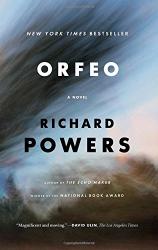Orfeo
Review
Orfeo
In LEVELS OF LIFE, his uneven but moving memoir about the death of his wife, Julian Barnes refers to Orfeo ed Euridice, the 1762 opera by Gluck, as “the opera most immaculately targeted at the griefstruck.” In the opera, based on the myth of the musician Orpheus, the gods allow Orfeo to go to the Underworld to bring his deceased wife back to earth as long as he promises not to look at her until they return. Unfortunately, he can’t resist reneging on his promise.
Richard Powers gives us a modern variation on this theme in ORFEO, his new novel. He never mentions the Gluck opera, but the book is the story of a man so obsessed with music and the need to create --- his Euridice, if you will --- that he’s willing to jeopardize just about everything for the sake of his quest.
Peter Els is 70 and retired from his job as a music professor at Verrata College in eastern Pennsylvania. He is a devotee of avant-garde composers like Harry Partch, John Cage and Milton Babbitt, the last of whom wrote the famous essay “Who Cares If You Listen?”, the Magna Carta of 20th-century serialism. Els originally wanted to be a chemist, but ended up studying music at a college in Indiana. In his undergraduate years, he favored populist works like Samuel Barber’s Hermit Songs but later embraced credos such as Duke Ellington’s “When art ceases to be dangerous, you don’t want it," and wrote modernist pieces closer in spirit to the complex works of Olivier Messiaen and Elliott Carter.
"ORFEO is a surprisingly moving work. The novel is at its best in its tender moments between father and daughter, husband and wife, loves embraced and loves forsaken."
Els’s fascination with finding music in unusual places has led him to a unique hobby. He has set up a microbiology lab in his home, complete with cloud chamber bowls and thermal cyclers. He has purchased mail order synthetic DNA online. His goal is to modify the bacterium Serratia marcescens to see if he can locate patterns in genomes and thus a new type of music.
When the novel opens, Els’s golden retriever, Fidelio --- named for Beethoven’s (tonal) only opera --- has died. Els dials 911. The officers who come to his home tell him to call Animal Control, but they also notice his laboratory and become suspicious. The next day, agents from the Joint Security Task Force arrive to question him. They see not only the microbiology lab but also a framed manuscript written in Arabic. “That’s a sixteenth-century Ottoman manuscript showing an old system of musical notation,” Els says. Despite this explanation, they confiscate his incubator. The day after that, Els returns home to find yellow caution tape around his house and agents carrying out all of his lab equipment. He drives away rather than confront the agents. Soon, the media dub him the “biohacker Bach,” a garage terrorist intent on waging an attack against the United States.
The novel alternates flashbacks with present-day scenes of Els on the run. These flashbacks chronicle his relationship with Maddy, his wife and former classmate, and his daughter, Sara, to whom he was a stay-at-home father. Els’s desire to pursue his craft conflicts with his family duties, a dichotomy familiar to all ambitious parents. This conflict builds until Els is forced to choose between these opposing tensions and deal with the repercussions of his decision.
Fans of Powers’s work will know what to expect from ORFEO: the dense writing about science and music, the gorgeous prose, the dizzying amount of technical jargon. He devotes 13 pages to Messiaen’s Quartet for the End of Time and five to Steve Reich’s Prodigy. Your appreciation of this novel will depend on your interest in the minutiae of cell biology and classical music.
What you might not expect from Powers is warmth. ORFEO is a surprisingly moving work. The novel is at its best in its tender moments between father and daughter, husband and wife, loves embraced and loves forsaken. And Powers writes well about music. When the young Els and a girlfriend listen to Mahler’s Kindertotenlieder, “they sat stock-still, blood pounding, tangled in each other, listening to the muted reds and russets of dying children.” Powers’s writing reminds me of Schoenberg’s famous line: “There is still plenty of good music to be written in C major.” The same is true of novels. Experimentation is a noble pursuit, but that’s no reason to turn your back on common themes.
Reviewed by Michael Magras on January 24, 2014
Orfeo
- Publication Date: September 2, 2014
- Genres: Fiction
- Paperback: 400 pages
- Publisher: W. W. Norton & Company
- ISBN-10: 0393349845
- ISBN-13: 9780393349849











